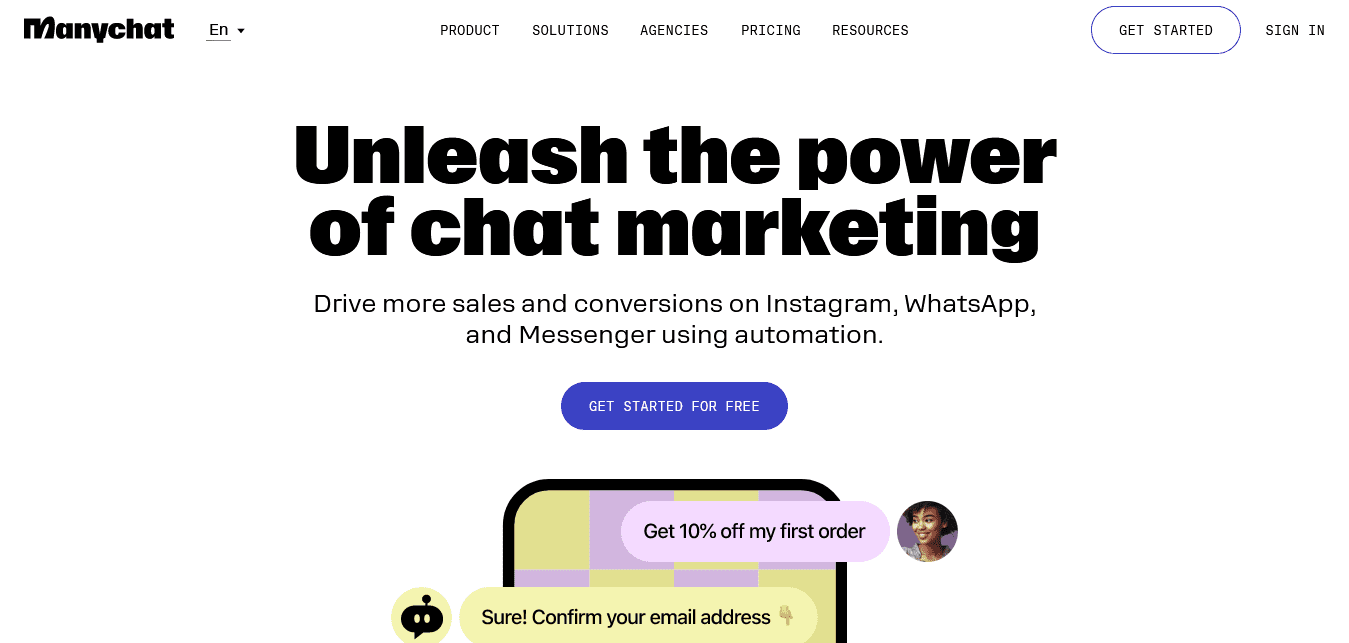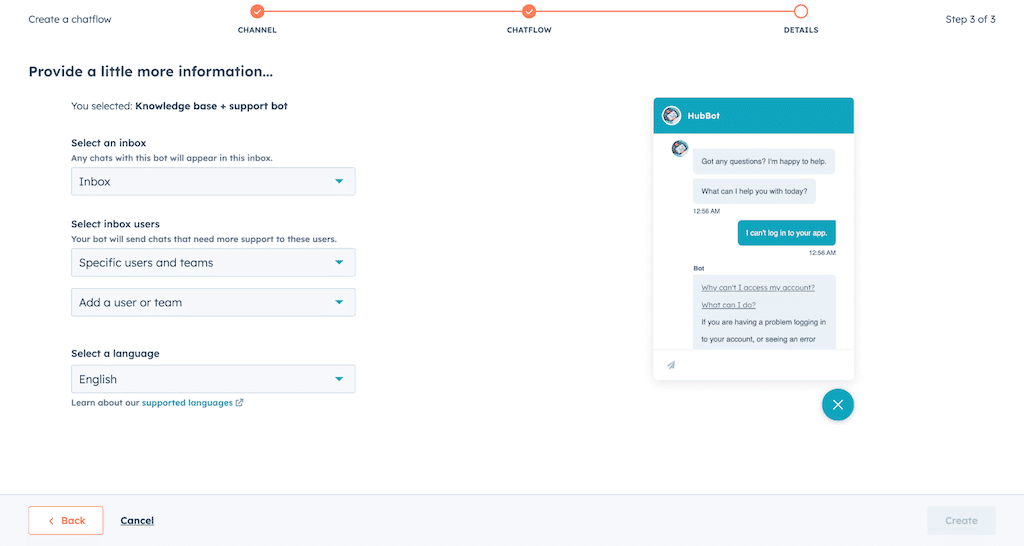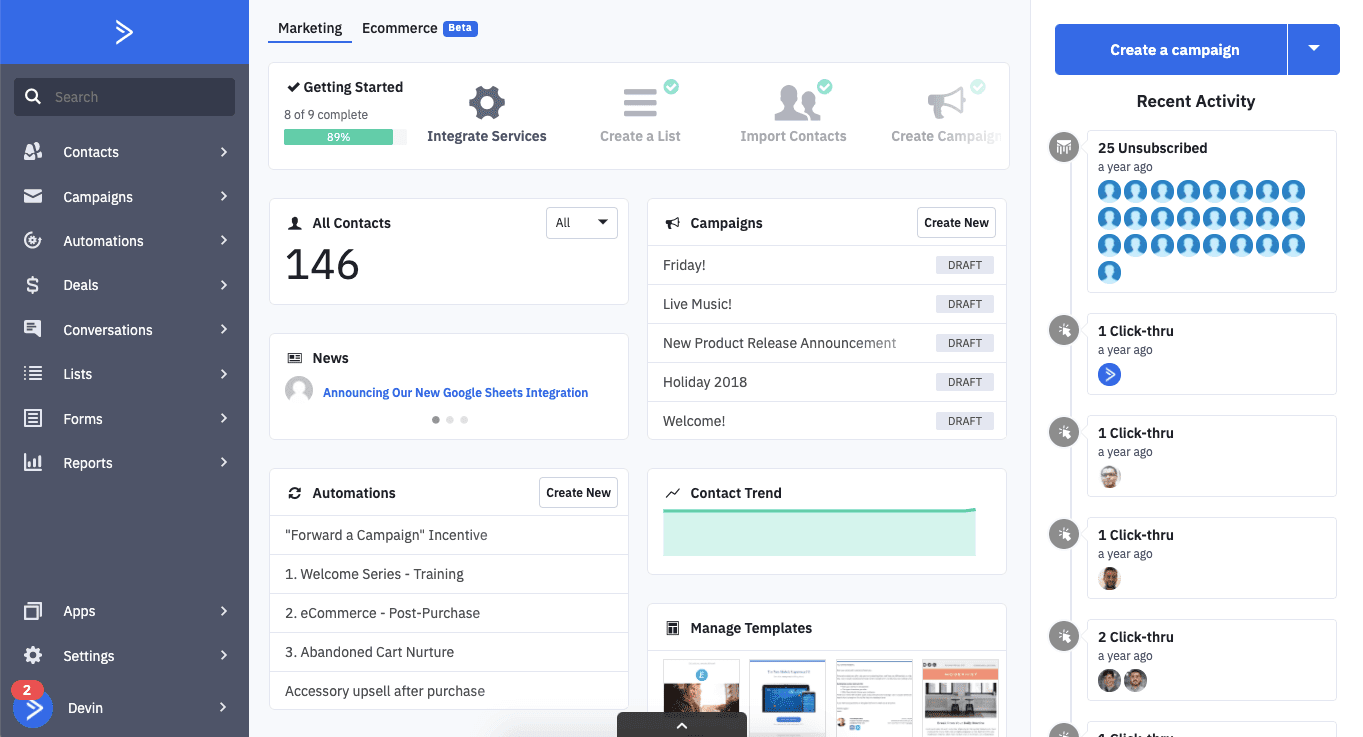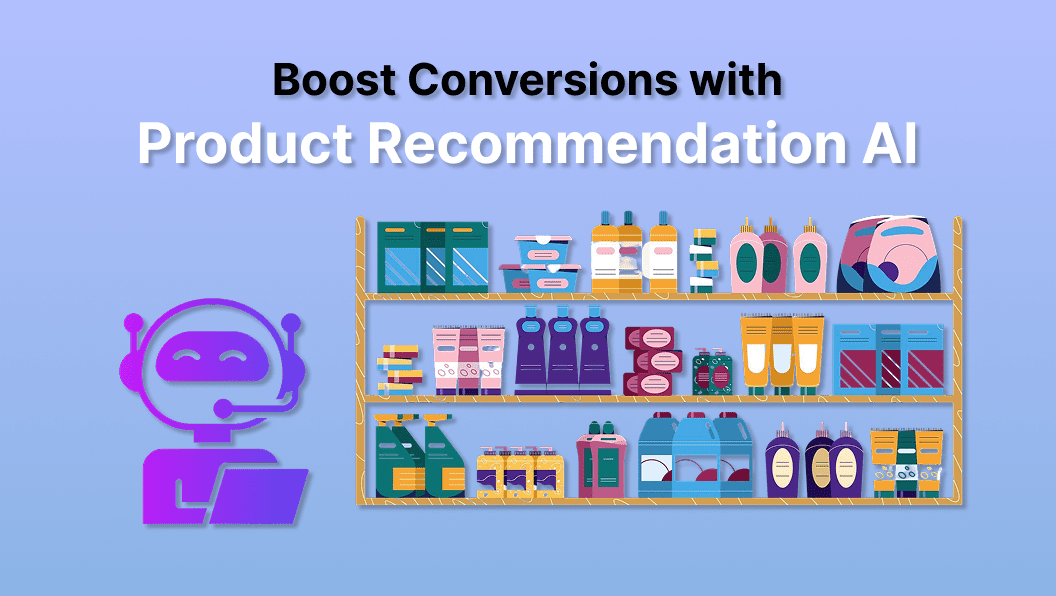A recent Nextiva study shows that 79% of businesses now view customer experience as a source of revenue rather than a cost. To meet rising demands for real-time, personalized communication across channels, companies need scalable, flexible tools. While Manychat is popular for chatbot automation, especially among small businesses, its limitations in customization, analytics, and channel support make it less ideal for growth. This article explores top Manychat Alternative solutions that offer more advanced features, better scalability, and true omnichannel capabilities.
Part 1. Key Features & Disadvantages of Manychat

# Key Features of ManyChat
- ManyChat is a well-known chatbot solution that is very user-friendly and has a high commitment to Facebook Messenger.
- It allows creating chatbots in its visual drag-and-drop flow builder, even for those with no technical experience.
- Businesses have an opportunity to send broadcasts and automated series to interact with users in the form of personalized drip campaigns.
- In ManyChat, it is possible to segment the audience depending on behaviour or on tags and custom fields to send messages only to these segments.
- It also has seamless connections with other significant platforms such as Shopify, Google Sheets, and Zapier.
- Also provide an integration with some email-based marketing tools, which makes the smooth transfer of data from system to system.
# Disadvantages of ManyChat for Growing Enterprises
Although ManyChat has a nice variety of features, a number of them become huge drawbacks in the case of medium and large-sized enterprises whose demands are more complex.
- Limited Channel Support: Mainly built for Facebook Messenger, with minimal support for WhatsApp, SMS, Instagram, or web chat—making it unsuitable for true omnichannel strategies.
- Basic AI Capabilities: Lacks advanced NLP and sentiment analysis, limiting its ability to handle complex conversations.
- Poor Workflow Scalability: No built-in version control or collaboration tools, which makes scaling chatbot workflows difficult for larger teams.
- Restricted System Integration: Limited ability to connect with CRM, ERP, or other enterprise systems.
- Simple Analytics & Reporting: Built-in dashboards offer only basic insights. Deeper analytics often require third-party tools.
- Lacks Enterprise-Grade Compliance: Does not provide robust security or compliance features required by large organizations.
Part 2. 3 Manychat Alternatives for Small Business
Small businesses in search of economy and a hassle-free process usually prefer it to be fast to implement and give immediate results. The Manychat Alternatives presented below are a fine combination of quality and affordability.
1 Chatfuel
- G2 Score: 4.4/5 stars
- Pricing: Starts at $23.99 per month

Chatfuel is a no-code chatbot solution with the most popular AI-driven bots built on the Facebook Messenger and Instagram platforms. It has a rather simple interface and an extensive list of options to program customer communication and marketing campaigns. So, it would be quite a good option for the automation of small businesses, in case they need more than simple Messenger options.
Pros
-
Very Easy Chatbot Builder: Entrepreneurs running small businesses and marketing teams can create and publish chatbots in no time without any technical skills.
-
Instagram Automation: Chatfuel is a significant capitalization of small businesses since it can be used to support direct messages, mentions in the story, and answer comments on Instagram.
-
AI Common Questions: Chatfuel provides a reasonable capacity of Artificial Intelligence that can take care of the commonly asked questions. Thus reducing the costs of human access regarding frequently asked questions.
Cons
-
Less Channel Support: Though it supports Instagram too, Chatfuel does not fully support other important channels like WhatsApp, Telegram, or website live chat. This can be a constraint in the case of businesses, which expect to have an omnichannel presence.
-
Complex Functions Need Workarounds: Additional AI utilities or more specialized integrations may need to work arounds. Especially, where small companies may need to make custom API calls to any solution, adding complexity.
-
Support of More Complicated Workflow: As a small company features extension to medium to large companies, Chatfuel might become apparent. As it has its constraints in supporting the most complicated workflows, lots of data, and colossal teamwork.
2 Customer AI ( Formerly MobileMonkey)
- G2 Score: 4.8/5 stars
- Pricing: Paid plans start at $199/month

MobileMonkey entails a chatbot platform that assists a business in communicating with customers simultaneously in several channels. Such channels are Facebook Messenger, Instagram, SMS, web chat, and WhatsApp.The Chatbot solution provides a solution in lead generation, customer support, and marketing automation. Therefore, it is effective with both large and small organizations.
Pros
-
Omnichannel functions: Chats that small businesses receive are able to be all in one place which means that it is easy to monitor conversations on a large number of channels.
-
Leads generation interest: It is beneficial to the businesses that want to expand their customer base because MobileMonkey has all these capturing, qualifying, and nurturing leads tools and templates.
-
Integrated inbox: The platform allows resolving the problem of separate message-receiving channels. By having all of the messages answered in the same box, it helps save the time of small teams.
-
Easy to use interface: Although it has numerous channels available, MobileMonkey makes its interface easy enough that it can be used by smaller organizations.
Cons
-
Steeper Learning Curve than ManyChat: The interface is intuitive, but compared to ManyChat, which is limited to just Messenger, it takes longer to learn and get familiar with. There are also too many features and additional channels.
-
Pricing Can Scale Quickly: Small businesses are able to afford this platform. But the number and features may lead to an increase in cost during use.
-
Advanced AI is Limited: MobileMonkey has keyword recognition and simple NLP. Its AI in complex and sophisticated discussions might not be up to a specialized AI bot.
3 Tidio
- G2 Score: 4.7/5 stars
- Pricing: Premium plans start at $0.5 per conversation

The primary advantage of Tidio is that it offers live chat as a product, but it also provides a potent chatbot that allows businesses to automate customer support, generate leads, and respond to frequently asked questions on their websites. This suits it well to small companies which deal with website interaction.
Pros
-
High-quality live chat: Tidio integrates live chat with chatbot automation that ensures that a conversation can seamlessly transition between chatbot and representatives.
-
Website orientation: Tidio excels in maximizing the use of websites, so it is best suited to e-commerce and service websites with the primary chat with their customers.
-
Simple to install: Tidio is known to be installed easily and quickly, and this means that small businesses can install a chatbot in the shortest time possible.
-
Cost-efficient and scalable: Tidio offers a free plan with the basic features, and its paid plans are usually affordable to small businesses and can be scaled with the business requirements.
Cons
-
Lack of support for social media channels: Tidio supports only a few social media channels, and its chatbot features are not as developed as those of websites dedicated to a particular channel (such as Messenger or Instagram).
-
Chatbot capabilities are simpler: The Tidio chatbot builder can be effective when it comes to simple questions. But it cannot match more specialized platforms with their advanced logics and deep integrations.
-
Mainly reactive: The advantage of Tidio is that it is reactive to the visitors of your website. Its outbound messaging capabilities might not be as developed as those focused on more general marketing automation.
Part 3. ManyChat Alternatives for Medium and Large-Sized Enterprises
Medium and large businesses should have tools that possess unrivaled scalability, vast integration options, sophisticated AI, and high-level security. They also support accommodating the extensive workload in interactions and tangled business processes.
1 HubSpot Chatbot Builder
- G2 Score: 4.3/5 stars
- Pricing: HubSpot's Chatbot Builder has a free tier. It also offers paid plans with more advanced features that cost $100 per month.

HubSpot Chatbot Builder is an add-on to the HubSpot CRM platform. It allows businesses to create automated chat conversations that can qualify leads, schedule meetings, and answer questions. It also includes many other things, all within their websites and on Facebook Messenger.
Its actual power lies in the fact that it seamlessly integrates with HubSpot marketing, sales, and service hubs. So, it enables the teams to see a unified picture of every customer interaction.
Pros
-
Built-in CRM: In case a company already utilizes HubSpot, the chatbot communicates with existing CRM data. This seals the loophole of disorganized customer data.
-
Fully-fledged system: Since it belongs to the HubSpot ecosystem, it easily integrates with email marketing, sales automation, and customer service. It can be described as a seamless solution at the entire enterprise level.
-
Lead qualification and booking of meetings: HubSpot is also very good at taking leads and booking meetings directly into the calendar of sales reps. Which is a critical component of big sales teams.
-
Marketing and sales ops scalability: It is a platform that scales with businesses and provides functionality to a high number of users, multiple brands, and elaborate sales funnels.
Cons
-
Cost Can Be High for Enterprises: Although HubSpot is very affordable, its plans at the enterprise level are quite expensive. Thus, companies that are not already using HubSpot may not afford it.
-
Limited Omnichannel (Beyond Web/Messenger): The platform is powerful in websites and Messenger. It might require an additional tool or support the less mature channels like WhatsApp and Telegram over the dedicated omnichannel platforms.
-
Learning Curve for Full Ecosystem: The chatbot can be used easily. However, to fully utilize all the features of HubSpot, one has to spend some time and do some work.
2 Intercom
- G2 Score: 4.5/5 stars
- Pricing: $29 per seat/ per month

Intercom is a leading conversational relationship platform designed to help businesses build stronger customer relationships through targeted messaging, live chat, and automated bots. It offers a sophisticated suite of tools for customer support, engagement, and marketing. This makes it a strong choice for enterprises focused on a unified customer experience.
Pros
-
Full Conversation Platform: Intercom integrates live chat, email, and in-app messaging, and its powerful chatbot builder (Custom Bots and Resolution Bot) to form a single platform to provide enterprises with a comprehensive customer communication strategy. This eliminates the issue of communication channels that are different.
-
Effective Segmentation: Intercom also has powerful segmentation functions. It allows businesses to deliver highly segmented messages and serve bots to chosen customer groups to enhance personalization and effectiveness.
-
Powerful Customer Support Automation: Intercom has powerful customer support automation. This thing enables businesses to deflect frequent questions, deliver immediate responses. And also smoothly transfer the complicated cases to human operators.
-
Wide Ecosystem integration: Intercom is integrated with a wide ecosystem of business tools, such as CRMs, marketing automation tools, and analytics tools.
Cons
-
High Cost of Full Suite of Capabilities: Intercom is advertised as a high-end product, and may not be affordable to medium and large sized companies when utilising the entire suite of capabilities.
-
Too Much for Smaller Teams: The features of Intercom are quite powerful. But having such a variety of functions may overwhelm smaller teams that do not have resources to manage the platform in an effective way.
-
Reduced Visual Bot Building: Although powerful, the bot builder may be not as drag-and-drop intuitive as ManyChat when it comes to less complex flows. Thus, it may take a bit more knowledge of how it works.
3 ActiveCampaign
- G2 Score: 4.5/5 stars
- Pricing: Ranging from $15 to $589 per month

ActiveCampaign is mainly associated with a powerful marketing automation and CRM solution. But it also has rich conversational automation features, both on its site messages and chatbot capabilities. It can assist businesses in designing custom customer experiences through email, messaging, and browsing experiences. Thus, it is a powerful choice when a business wants to coordinate its conversational initiatives with its wider marketing activities.
Pros
-
Integration of Deep Marketing Automation: ActiveCampaign integrates chatbot functionality with its email marketing, CRM, and sales automation. This means that when a customer is talking to the chatbot, the chatbot can automatically send highly personalized messages on their behalf. This eradicates the problem of the various components of marketing working in isolation.
-
Visual Automation Builder: The visual builder of ActiveCampaign is similar to the one offered by ManyChat. Moreover, it allows companies to create complex workflows that can involve messages in chatbots, email sequences, and lead-scoring rules.
-
Comprehensive Segmentation: Sophisticated segmentation allows companies to customize chatbot interactions depending on the behavior of the user, CRM data, and their history.
-
Growth Scalable: The platform will assist expanding businesses. This is because it has features and the ability to handle large contact lists and sophisticated automation.
Cons
-
No Standalone: The chatbot offered by ActiveCampaign is not a standalone tool but is included in a marketing package. Thus, it is not the best option when you simply want to use a standalone chatbot tool.
-
Very Little Social Support: Excellent with email and the web but lacks native social media chatbot features; except when you add-on additional integrations.
-
Steep Learning Curve: You will not be able to reap all the benefits of it without taking your time and effort to explore its advanced automation tools.
4 GPTBots
- G2 Score: 4.8/5 stars
- Pricing: GPTBots are custom-made in terms of prices. It includes the number of individuals using the service, the amount of work to accomplish by the AI models, the kind of tools required to integrate with other systems, and the number of conversations to operate.

GPTBots is a powerful enterprise-grade AI platform built for medium to large organizations seeking intelligent, customizable, and scalable chatbot solutions. Leveraging advanced large language models, GPTBots helps businesses automate customer support, streamline internal knowledge search, and unlock actionable data insights through conversational AI.
Pros
-
Advanced AI & Language Understanding: Powered by leading large language models, GPTBots handles complex queries with human-like comprehension—minimizing the need for live agents.
-
Deep Customization: Offers extensive flexibility to tailor AI behavior, workflows, and integrations to match business logic and system requirements.
-
Enterprise-Grade Security: Built with robust data protection, compliance standards, and privacy features to ensure secure handling of sensitive information.
-
Scalable Performance: Supports high-concurrency environments and large-scale data processing, making it ideal for growing enterprise operations.
-
Versatile Use Cases: Excels in customer support, enterprise search, employee onboarding, and workflow automation.
-
Omnichannel Compatibility: Easily integrates with web, mobile, and messaging platforms via API to enable seamless multi-channel interactions. interaction.
Cons
-
High-Cost, Custom Pricing: Requires a detailed sales process and is a major investment.
-
Needs Technical Expertise: Full capabilities may demand in-house tech skills or external support.
-
New to Market: Fewer reviews and case studies, though potentially more agile and innovative.
5 Drift
- G2 Score: 4.4/5 stars
- Pricing: Starts at $2500/month

Drift is one of the most popular conversational marketing platforms, which allow companies to chat with their web visitors in real time, qualify leads, and accelerate the sales processes. It combines live chat, chatbots based on Artificial Intelligence, and the possibility to make an appointment to provide an individualized experience on the webpage.
Pros
-
Sales-Focused AI: Automates lead qualification, routing, and meeting bookings directly on websites.
-
Personalized Targeting: Delivers custom messages based on visitor behavior and CRM data.
-
Strong Integrations: Works well with Salesforce, HubSpot, and major marketing tools.
-
Chatbot + Live Chat: Smooth handoff between bots and human agents ensures efficient support.
Cons
-
Web-Only Focus: Limited native support for social platforms like Messenger or WhatsApp.
-
Expensive: Premium features come at a high cost for enterprises.
-
Needs Constant Tuning: Regular optimization required for best results.
Conclusion
With the business change, the conversation also needs to change. ManyChat is an excellent entry level tool, however, successful companies require scalable, intelligent and multi-channel solutions. Chatfuel, MobileMonkey, and Tidio are some of the simplest, inexpensive tools available to small companies.
However, businesses must use sophisticated tools like HubSpot, Intercom, Drift, or GPTBots.ai to operate complicated customer journeys and machine-based automation. The selection of an appropriate ManyChat alternative is a strategic choice in line with long-term plans concerning customer relationship, operational effectiveness, and expansion.
The perfect platform will enable organizations to surpass the expectations of their customers and achieve success in the rapidly changing, digitally focused business environment.







